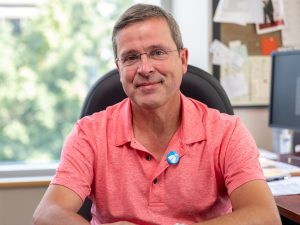
A message from Sharon Lee, Executive Director, CPFF
For our first issue of Hope Breathes Here in 2022, I am pleased to share with you a number of hopeful initiatives past, present and future.
A recent presentation by Dr. Martin Kolb, a member of our Medical Advisory Board, takes a look at the amazing progress research has made during the last 25 years in increasing our knowledge of pulmonary fibrosis and in the treatment of disease. He is optimistic that within 10 years, researchers will find a way to halt the progression of pulmonary fibrosis. That is hopeful news. And CPFF is proud to continue to invest in PF research.
To help you alleviate feelings of stress, anxiety and isolation, we’ve just launched a weekly National Social Group, using Zoom. Participants join “break out” rooms to chat about topics of interest to them – not related to PF. We hope it helps bring a bit of joy into your day. Read article three below to find out how to join in.
CPFF is also forging ahead with updating our strategic plan for 2022-2023. Ideas and information from a recent stakeholders meeting, along with results from our patient and caregivers survey will help the Board set priorities and the budget for the upcoming fiscal year (our year-end is July 31) with the ultimate goal of improving life for those affected by pulmonary fibrosis.
Later this month, we’ll also be sharing with you our contributions to an awareness campaign for Rare Disease Day on February 26. Follow us on Facebook and Twitter to stay informed.
Finally, I encourage you to do what you can to stay hopeful. Join one of our support groups. Bundle up on the sunny days for a short walk. Soak in the beauty of the snow-covered outdoors. Help someone else. Think about the things you can still do and enjoy. Be kind to yourself and others.
We will discover how to stop the progression of pulmonary fibrosis, says Dr. Kolb

Dr. Martin Kolb, Research Director, Firestone Institute for Respiratory Health, in Hamilton, is optimistic that within 10 years, researchers will find a way to halt the progression of pulmonary fibrosis. He made this statement during the question-and-answer period of his January 25 presentation titled: “From Nothing to Disease-Altering Management: A 25 Year Journey of Pulmonary Fibrosis Research.”
As the 2021 recipient of the Anne & Neil McArthur Research Award at St. Joseph’s Healthcare Hamilton, Dr. Kolb was the featured speaker at an online academic presentation. Dr. Kolb was honoured for his 25 years at “the forefront of international respirology research and care. His pioneering work in idiopathic pulmonary fibrosis has quite literally changed, improved and extended the lives of people living with this debilitating lung disease for which there is no cure. The author of 300 peer-reviewed articles, the Chief Editor of the European Respiratory Journal, and the holder of multiple research chairs, Dr. Kolb is a most deserving recipient of the McArthur Research Award,” states the research award citation. Dr. Kolb is also a member of CPFF’s Medical Advisory Board.
In talking about his research career, and hopes for the future of pulmonary fibrosis research, Dr. Kolb related how much IPF treatment has changed in the past 25 years. When he was starting out, anti-inflammatory drugs and immunosuppressant medications were the standard IPF treatments. “These were eventually found not to be effective,” he said.
In the intervening years, research has offered a great deal of hope, with anti-fibrotic medications slowing disease progression by up to 50 per cent, in all stages of the disease and in several different types of progressive pulmonary fibrosis.
Throughout his talk, Dr. Kolb graciously acknowledged his mentors and colleagues. “There are so many people involved in our research and our clinic team is amazing. I could not do what I do without them. And our patients are very involved and grateful.” He also pointed out that both within and beyond his own lab, researchers around the world often toil without reward, as they identify and investigate possible compounds, most of which will not become medications. “From the bench (labs) to bedside research, there are very many of us working to improve life for people living with pulmonary fibrosis.”
During his presentation, Dr. Kolb referred to clips of a video (one of McMaster University’s “Demystifying Medicine” series), called “Idiopathic Pulmonary Fibrosis: The Basic Facts,” which explains the process of scarring of the lungs, or fibrosis, at the cellular level, as well as other basic facts about the disease.
Dr. Kolb also explained how IPF is diagnosed and treated today and how survival rates have improved. He also touched on how treatment and quality of life is addressed by a multi-disciplinary approach to “see the whole patient,” not just the disease and medications. “There are many ways we can help patients live better with their disease.”
In closing, Dr. Kolb pointed out that while “25 years of research may seem like a long time, it is only the beginning of what is possible.” And, as in much of life and innovation today, the pace of change is accelerating.
In a CPFF webinar last September “Drug Therapy for Pulmonary Fibrosis,” Dr. Kolb highlights some of the promising new compounds being investigated and current clinical trials.
Add a bit of joy to your life with social interaction

Just a few weeks ago, CPFF launched its National Social Meetings using Zoom to connect members of the PF Community to share interests and stories about things that are bringing them joy as we deal with another pandemic winter.
From books and movies to recipes, crafts, sports or gardening, the participants decide on a few topics for the meeting and then separate into “break-out” rooms on Zoom so that everyone has a chance to participate in the smaller-group sessions, talking about something that interests them.
“We want to help people alleviate their feelings of stress, anxiety and isolation, brought on by living with a chronic illness during the pandemic. It’s a way to bring a little joy back into all our lives,” says CPFF Project Coordinator Roberto Zapata.
These meetings are different from CPFF Support Group Meetings, which focus on educating participants about pulmonary fibrosis and helping them manage their disease, as well as support one another. These new, national meetings are more about topics other than the disease, even though it may be the one thing everyone has in common.
Anne Hurding of Oakville, Ontario, has enjoyed the meetings and last time shared her recipe for homemade muesli, “using less sugar than store-bought brands.” She also received one for chocolate chip cookies. “Anything that adds to my hopeful and positive attitude, I’m all for it,” she says.
Frank Driscoll loves the meetings, “especially the break-out groups.” His wife Jude was “delighted to hear him laughing out loud during the call.” And Frank and Jude have lots of great ideas for small-group conversations, like “Cars and truck I’ve owned: My favorites and the lemons,” sharing stories about vehicles and road trips. Or a group for those who follow sports: hockey, football, or soccer for example, with maybe even a pool involved. Or a gardening group to talk about choosing seeds and starting seedlings in the coming months. Or a wine and spirits group to talk about regional favorites and what’s available across the country. The possibilities are only limited by your suggestions. And they can be different each week.
There are so many ways participants find joy in their lives, and the more people that are involved, the more wide-ranging the topics will be. Anne has suggested a friendly trivia contest, with people in teams. “We’re all within a 25-year age range, so the questions could be geared to us.”
The calls take place each Tuesday afternoon at 2 p.m. EST. If you are interested in joining the meetings and adding a bit of joy to your life, send an email to [email protected] with the subject line “Join National Social Meetings” and we will add you to the list of participants. You will then receive an email with a link to the meetings each week. Note that although the majority of the participants are English-speaking, French-speaking individuals are also welcome.
If you are unfamiliar with Zoom, you can watch easy-to-follow tutorial videos on Zoom Learning Centre.

As we enter 2022, the more transmissible Omicron variant of COVID-19 has taken over as the most prevalent form of the virus. It is causing the latest challenges in our health care systems with increased hospitalizations and ICU admissions. Healthcare staff shortages are the result of staff getting the virus or needing to quarantine because of exposure (as well as burnout from this long pandemic.) Staff shortages mean delays for procedures and surgeries not related to COVID-19.
What can you do to stay safe and help your loved ones and community stay safe during this latest surge of infections? Should you wear a different type of mask? How do you protect your children, or grandchildren? What about testing? Should you get a booster, if you have had COVID-19? Are there new treatments of COVID-19?
A recent video by UHN (University Health Network) in Toronto, broadcast on January 20, 2022 answers these questions and many more. Although some of the protocols and information is Ontario-specific, much of the information is relevant no matter where you live in Canada. And, although it is aimed at the general public, rather than those with chronic illness, it does offer reliable information about keeping safe from Omicron.
Moderated by Christian Cote, the video is a series of questions answered by Dr. Alon Vaisman, infection control physician at UHN. On the positive side, vaccines are working; reducing hospitalizations, deaths and cases of long-COVID-19. For most people, boosters appear to be keeping severe symptoms of Omicron in check.
Unfortunately, those most affected by this variant are the unvaccinated, older people and those living with chronic illnesses and/or a compromised immune system. People living with pulmonary fibrosis are often older and immune compromised. What can you do to stay safe?
The best advice remains the same as for other variants of COVID-19. Get vaccinated, including getting a booster shot. Keep up with other vaccines, such as those for pneumonia and the flu. Wear a well-fitting mask when out in public. Practice social distancing. Avoid crowds and others who are sick. Follow public health instructions.
UHN regularly offers a series of videos called “COVID-19: A Virtual Q&A.” The next video “Safeguarding our mental wellness under shifting tides,” will be held Thursday, February 10, 2022 from 5 to 6 p.m. EST. You can register online and listen online or by telephone.
For more information about COVID-19, or how to get a vaccine or booster, contact your primary healthcare professional or local public health unit. You can find a listing of national and provincial public health agencies on the “Helpful Links” page of the “COVID-19 section” on the CPFF website. You’ll also find other videos and articles on COVID-19.
CPFF now accepting applications for research fellowships

A big part of CPFF’s mission is to support research into pulmonary fibrosis. We are pleased to continue to invest in two, Robert Davidson Fellowships for 2022-2023. The deadline for applications is March 18, 2022 and candidates will be informed by April 15, 2022.
As a patient or caregiver, you can help us promote the fellowships by letting members of your healthcare team know about this opportunity. Feel free to send them the link to the information they need to apply.
The fellowships support eligible physicians who wish to further their training in PF in order to advance clinical, translational, or basic science knowledge in the field and deliver excellence in clinical care to the PF patient community in Canada.
A Robert Davidson Fellowship supports a one-year fellowship in PF in Canada with at least 75 per cent of their time protected for research-related activities. The combination of clinical and research activities will provide candidates with the opportunity for academic career development that will enable candidates to become key national and international members of the ILD community.
Candidates will be expected to lead a research project at their training institution, with the goal of also participating in multicentre activities that will establish nationwide connections with other Canadian centres.
The CPFF looks forward to announcing the successful candidates in the May issue of this newsletter.


